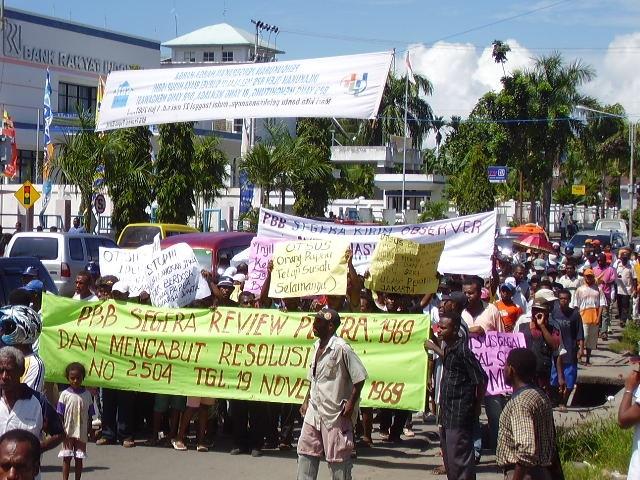West Papua Information Kit





Special Autonomy
Autonomy is an admission by Indonesia that the territory requires additional protections from normal Indonesian administration.
Autonomy was offered by the Megawati government as a substitute in place of self-determination. Self-determination is a process required by UN resolution 1514 and described in resolution 1541 as a globally agreed means to determine the sovereignty of foreign and subordinated peoples and nations.
The territory has repeatedly rejected Indonesian special autonomy; most notably in major rallies in 2005 presenting coffins said to contain the Indonesian proposal of autonomy, and in rallies conducted during June and July 2010.
Purported history
Responding to growing international awareness about West Papua; in 2001 President Megawati and the Indonesian Government created a Special Autonomy package for West Papua as well as allowing a name change for the province to "Papua". Indonesia hoped this autonomy package would dampen support for independence.
Although the package would on paper return up to 70% of the province's future revenue, it was rejected by the West Papuan people This refusal surprised the central government who seem to have great difficulty believing the West Papuan people want to be free of Indonesia. The Indonesian Government disregard of their promised Autonomy was confirmed in 2003 when President Megawati issued Presidential Instruction No. 1/2003, to divide Papua into three separate provinces.
The Presidential Instruction was legally problematic as the 2001 Special Autonomy Law No. 21 held a more legitimate legal status than the presidential instruction. The decree contradicted Law No. 21/2001 on special autonomy for Papua, particularly Article 76 which states that any policy affecting Papuans must be approved by the Papuan People's Council (MRP) in effect Papua can only with the approval of the MRP. (In August 2002, the Papuan parliament sent a draft bill establishing the MRP to the Ministry of Home Affairs, however, officially at the time of the division the MRP had not yet been established. The MRP has only come into being after long delays, under the present SBY government).
To the West Papuan people this presidential instruction to divide West Papua into a number of provinces was basically seen as a case of "divide and rule" i.e. to weaken the Papuan movement for self determination. In 2004, the Indonesian Constitutional Court overturned the controversial law that would have divided Papua into three new provinces, but ruled that one of the new provinces (West Irian Jaya ) would remain intact as it had already been established in line with constitutional requirements i.e. it became a de facto province. The formation of the third proposed province, Central Irian Jaya was disallowed.
In January 2008, Indonesia's House of Representatives endorsed its own plan to create another four provinces in West Papua. With the four new proposed provinces (which would exclude the province of Papua), there would be a total number of five provinces in the western half of the Island of New Guinea, Papua, West Papua, Southwest Papua, Central Papua, and South Papua. However, at this stage President Yudhoyono has postponed (not cancelled) the formation of the new provinces.
International law
Indonesia has no right to offer Autonomy, under international agreement Indonesia is instead required to comply with its obligations under the United Nations Charter and UN resolution 1514.
International community
Wishing to avoid the UN obligation to support self-determination for the West Papuan people, a number of governments have voiced supported the autonomy package.
West Papuan community
The elite and bureaucrats have received autonomy package funding, but the majority of West Papuans and their community have not. Though the Papuan people did not want to be part of Indonesia, they gave the alien government of Indonesia time to deliver on it promises, instead the government attempted to divide their nation and the Papuan people saw the autonomy funds used for corruption and for forces repressing Papuan cultures. The President of the Fellowship of Baptist Churches of West Papua, Rev. Socratez Sofyan Yoman, has said that Special Autonomy funds have been used to support military operations by the TNI against the West Papuan people.
There were a number of demonstrations against Special Autonomy.
 In May 2007, demonstrations occurred in Jayapura and Manokwari,
with thousands of students and Papuan business people protesting the fact
that Special Autonomy had failed to improve the welfare of the West Papuan
people and that the international community has not been allowed in
to see that Special Autonomy has failed.
In May 2007, demonstrations occurred in Jayapura and Manokwari,
with thousands of students and Papuan business people protesting the fact
that Special Autonomy had failed to improve the welfare of the West Papuan
people and that the international community has not been allowed in
to see that Special Autonomy has failed.

On 12th August 2005 some 20 thousand people formally presented the
corpse of the Indonesian Autonomy package, rejecting it.
The rally was completely peaceful yet the TNI/Indonesian
State Police using helicopters and armoured vehicles tried to
intimidate and cow the people.
A full news report is here.
At the beginning of July 2007, West Papuan students protested in the Central Java city of Yogyakarta rejecting special autonomy. At end of the protest they read out a statement rejecting six years of special autonomy because it had failed. They also condemned the splitting of Papua into two provinces and called on the government to open a national dialogue with the West Papuan leadership.
For forty five years the Papuan people have wanted honest dialogue with Jakarta and the world community to solve the problems which foreign mining and milia have created in their lands.
- Edmund Burke (1729-1797)
Home




